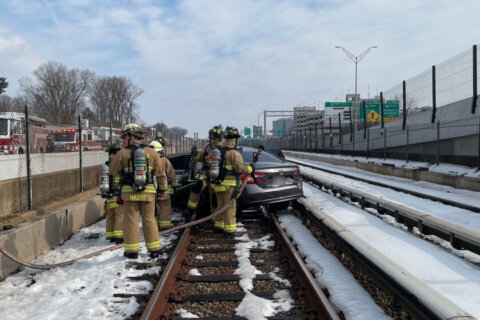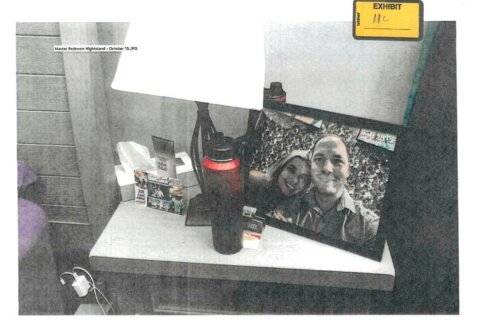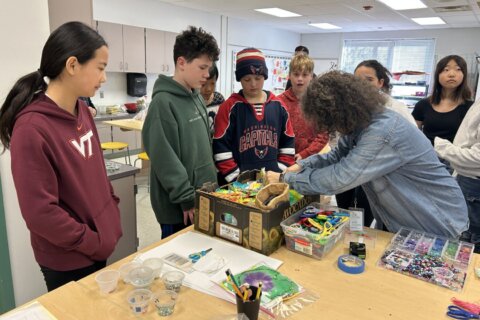FAIRFAX — Domestic violence victims in Fairfax County are getting new resources immediately after they call police. Two months in, the police department and victims’ advocates say the program is likely saving lives.
The Maryland Model Lethality Assessment Program rolled out in Fairfax County on July 1. All officers who respond to calls to help domestic violence victims directly connect the victims with advocates from the county’s Office for Women and Domestic and Sexual Violence Services.
Officers and advocates seek to identify the victims at highest risk by asking questions such as whether the accused abuser has threatened or stalked the victim, choked the victim or has access to a gun.
In July and August, more than half of the victims of domestic violence screened by police officers were found to be in “high-risk” situations.
More than half of those cases involved a history of stalking; nearly two-thirds involved a history of strangulation, and a third of the cases involved a firearm.
Fairfax County Domestic Violence Coordinator Sandy Bromley, one of the advocates available 24/7, says, “We’re connected immediately with that victim. We talk to them about their level of danger; we talk to them about options that are available for them, whether it’s immediate emergency shelter or advocacy options the next day, maybe a protective order or something like that, so we want to make sure that we start building that relationship with them then so they know that there’s somebody there to help them.
“They’re often left alone, so we’re there to say ‘There are people to help you, and you don’t have to be left alone.’”
As the name suggests, the screening program was developed and is already functioning in Maryland. Fairfax County Police Chief Ed Roessler says Maryland saw a 34 percent drop in homicides by intimate partners between 2007 and 2013, after the program was implemented.
“The primary goal of the LAP is to prevent domestic violence homicides, serious injury and re-assault by engaging victims early — in that initial call for service that the police officers respond to — by encouraging the victims to get support, shelter services and other support services from our domestic violence advocates in the community,” Roessler says.
All officers were trained in the program over the course of several months, and Roessler says they now go on patrol with cellphones that can be used to connect to the LAP hotline.
When officers determine that a victim is at high risk, they connect the victim with an advocate through the program’s hotline.
The program is active in at least some jurisdictions in 35 states, including Virginia. Ina Fernández, executive director of the Fairfax County Commission for Women, says Fairfax County is only the second jurisdiction in Virginia to fully implement the program, after Norfolk, and that it is focused on victims.
“It’s up to them to decide whether or not they speak with an advocate on the phone immediately when the officer hands over the phone, but what we’re finding is that most of the victims — 85 percent of them — decide to speak … right then and there,” Fernandez says.
The advocates ask whether the victim needs emergency shelter and attempt to help the victim plan their next steps. Advocates make a follow-up call 24 hours later to discuss other possible steps, such as restraining orders or job training.
“The LAP has opened our eyes to a larger set of lethality; it allows us to ask questions that perhaps weren’t asked before, especially right there at the scene, and also allows us to more proactively help the victim and help them access services immediately,” Fernandez says.
Roessler says that before this program, officers would file a report that would be passed on to specialized detectives to follow up on later.
“These are victims, prior to the LAP, that would not get these resources, and this is an effort at the ground level to prevent further violence and homicides,” Roessler says
The county is highlighting the evident success of the program as part of Domestic Violence Awareness Month.
“We’re serving at least two people per day, per 24 hours, that we were not catching before, and I pray and hope … that will reduce recurring violence and prevent a homicide,” Roessler says.
Fernández says a review of domestic-violence homicides showed that, although many victims had called police before, none had reached out to advocates for resources. This led to the decision to implement the program.
“What we know by research is that if and when they do [reach out], it reduces the risk of homicide,” she says.
Roessler says he is especially concerned about cases that go entirely unreported.
“There’s a lot of trust-building that the police department needs to do in the community, especially in our diverse communities where there are new arrivals to the United States of America and there’s just this inherent lack of trust in the police … . Our effort here is to get services to the victims,” Roessler says.
He hopes it will lead to the recognition that police officers are there to help prevent further violence, not to take people away.
Fernández says people or families facing domestic violence should call 911 in an emergency, or the general Fairfax County police number at 703-691-2131. Fairfax County has a 24-hour domestic and sexual violence hotline at 703-360-7273.







